As an Amazon Associate, I earn from qualifying purchases, and this post contains affiliate links to products I love ♥ See my full disclaimer here!
Cast-iron skillets have long been praised for their durability, excellent heat retention, & ability to create a natural non-stick surface. These versatile kitchen workhorses have been passed down through generations and treasured by culinary enthusiasts and professional chefs. However, a debate persists among cast iron enthusiasts: Do cast iron skillets really need to be washed after use?
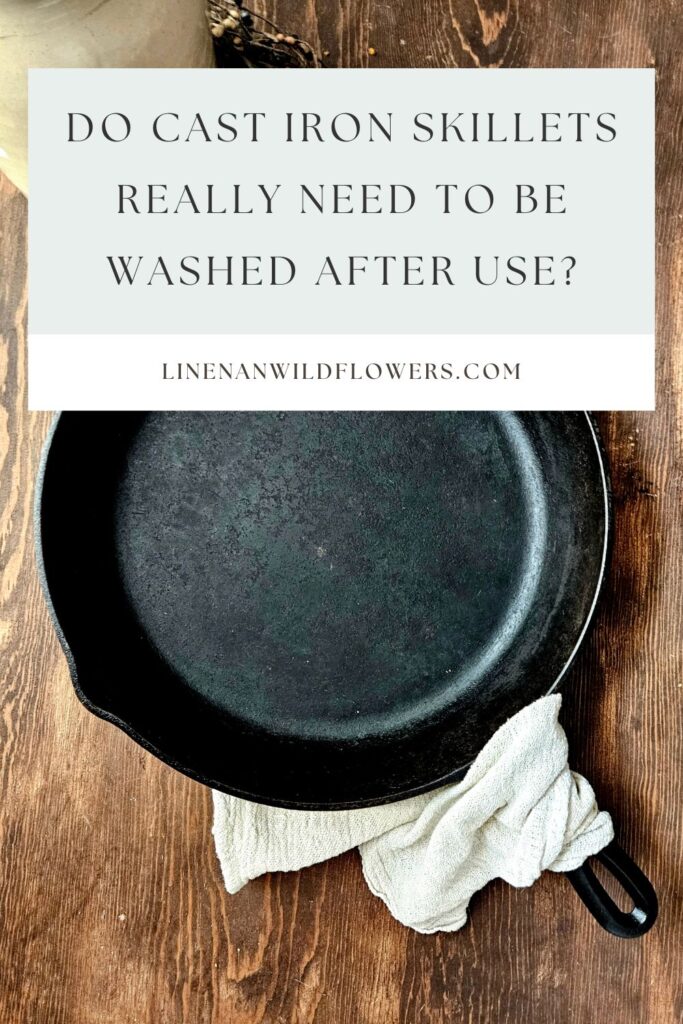
While it is generally recommended to wash cast iron skillets after use, indeed, they don’t necessarily need to be washed every time. Cast iron skillets are seasoned with oil, which forms a natural non-stick coating. This seasoning helps to protect the skillet from rust and can improve its cooking performance over time. So the commonly asked question is, do cast iron skillets really need to be washed after use? I will share the reasoning behind it whether you do or don’t!
Personally, I do not wash my skillets after every use unless I have cooked-on-food stuck to my skillets. Most times, I take a dry paper towel or a lint-free cloth & wipe out my cast-iron skillet. Some of you may ask why I do that. Well, for starters, more than likely, I will be using that skillet again. Secondly, it adds another layer of seasoning to my skillets. Growing up, back in the day when my grandmother, an amazing Southern cook, did the same process as I do today.
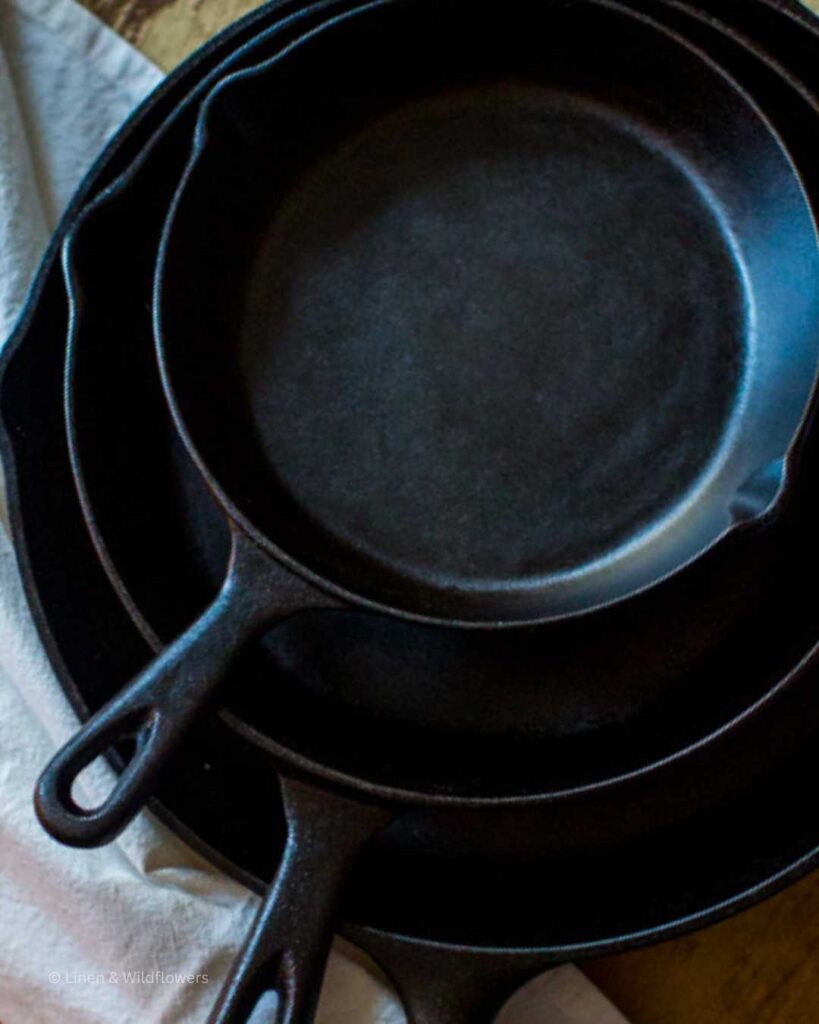
Even today, you will find that some people simply wipe out the skillet with a paper towel or a soft cloth after each use, especially if it’s used for cooking foods that don’t leave much residue, like frying eggs or searing meat. This method can help preserve the seasoning and maintain the skillet’s non-stick properties.
However, if the skillet has significant food residue or has been used for cooking something that leaves a strong flavor or odor, it’s generally best to thoroughly clean it. Washing with hot water and a gentle scrub will remove any food particles and help maintain the skillet’s cleanliness. Ultimately, whether or not you wash your cast iron skillet after each use is a personal preference. It’s important to consider factors like the type of food cooked, the amount of residue left behind, and your own comfort level with cleanliness. Regular maintenance, including occasional washing and re-seasoning, will help keep your cast iron skillet in good condition.
Favorite cast iron skillets
Although using my mother’s & grandmother’s skillets are my commonly used cast-iron cookware, I also love using Lodge cast iron skillets. I have quite of collection that is used daily. I have been cooking with cast iron cookware for many years and will never go back to using stainless steel pans.
What happens if I don’t wash my cast iron skillet?
While there is a popular belief that cast iron skillets should not be washed to preserve the layer of seasoning, it is important to strike a balance between cleanliness and maintaining the seasoning.
If you don’t wash your cast iron skillet regularly, several things can occur:
- Accumulation of food residue: Over time, food residue can build up on the skillet’s surface. This can result in the development of a sticky and unhygienic layer that affects the taste and quality of your food.
- Unpleasant odors and flavors: The skillet can retain odors and flavors from previous cooking sessions without regular cleaning. This can impact the taste of future dishes and result in an unpleasant cooking experience.
- Potential health risks: Neglecting to wash your cast iron skillet can also pose health risks. Bacteria can multiply on the leftover food particles, increasing the chances of foodborne illnesses.
While it is true that washing a cast iron skillet with soap and water can strip away some of the seasonings, this does not mean you should avoid cleaning it altogether. On the contrary, proper cleaning can help maintain the skillet’s cleanliness and prevent the buildup of undesirable residues.
To strike a balance, washing your cast iron skillet with hot water and a soft brush or sponge is generally recommended. Avoid using abrasive scrubbers or harsh detergents, as they can damage the seasoning. After washing, dry the skillet thoroughly and apply a thin layer of oil to maintain the seasoning.
Regular cleaning and occasional re-seasoning will help keep your cast iron skillet clean, well-maintained, and ready for future cooking adventures.
Can I just wipe my cast iron skillet instead of washing it?
Yes, it is a common misconception, particularly among some Southern cooks, that you can simply wipe a cast iron skillet with a dry cloth instead of washing it. The belief is that this method helps to preserve the layers of seasoning on the skillet and maintain its non-stick properties.
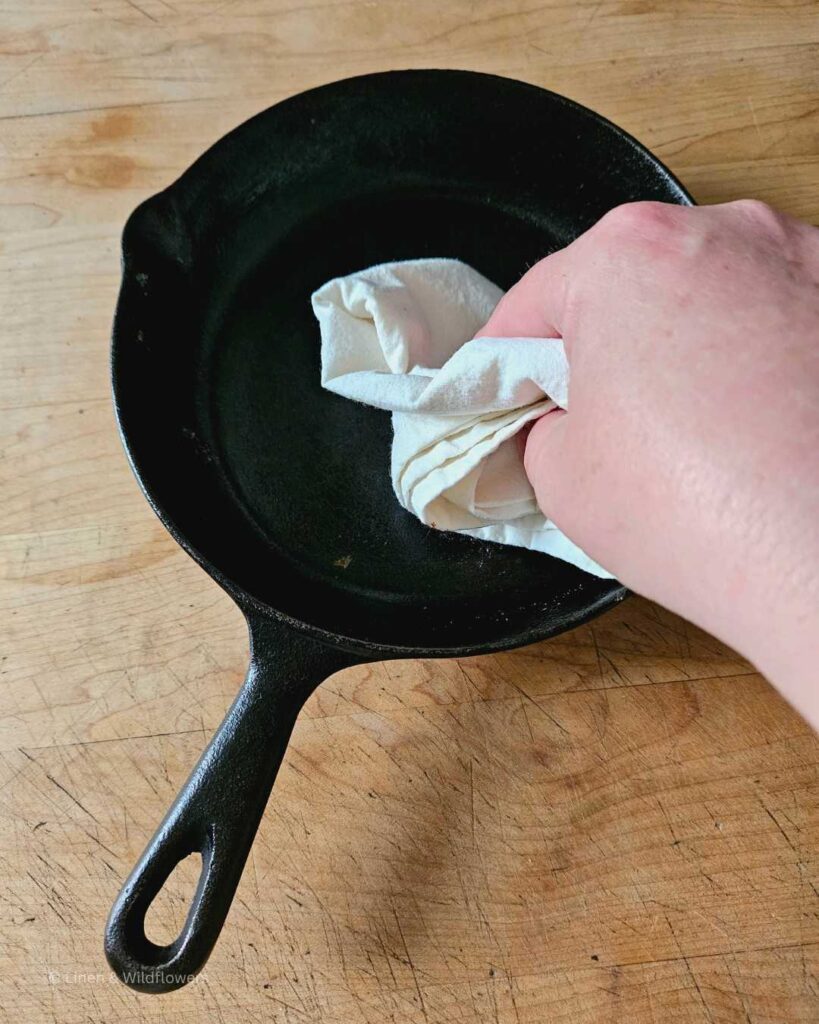
While wiping the skillet with a dry cloth can remove loose debris and oils, it is insufficient for thorough cleaning. Food particles and oils can still remain on the surface, which can become rancid and affect the flavor of future dishes. Moreover, this method does not address potential bacterial contamination, which can pose health risks.
Proper cast iron skillet cleaning involves washing it with hot water and a gentle brush or sponge. This helps to remove food residues and maintain cleanliness. It is important to note that using soap sparingly is generally acceptable and will not harm the skillet’s seasoning. Contrary to the myth, soap is effective at removing grease and bacteria without significantly stripping away the layers of seasoning.
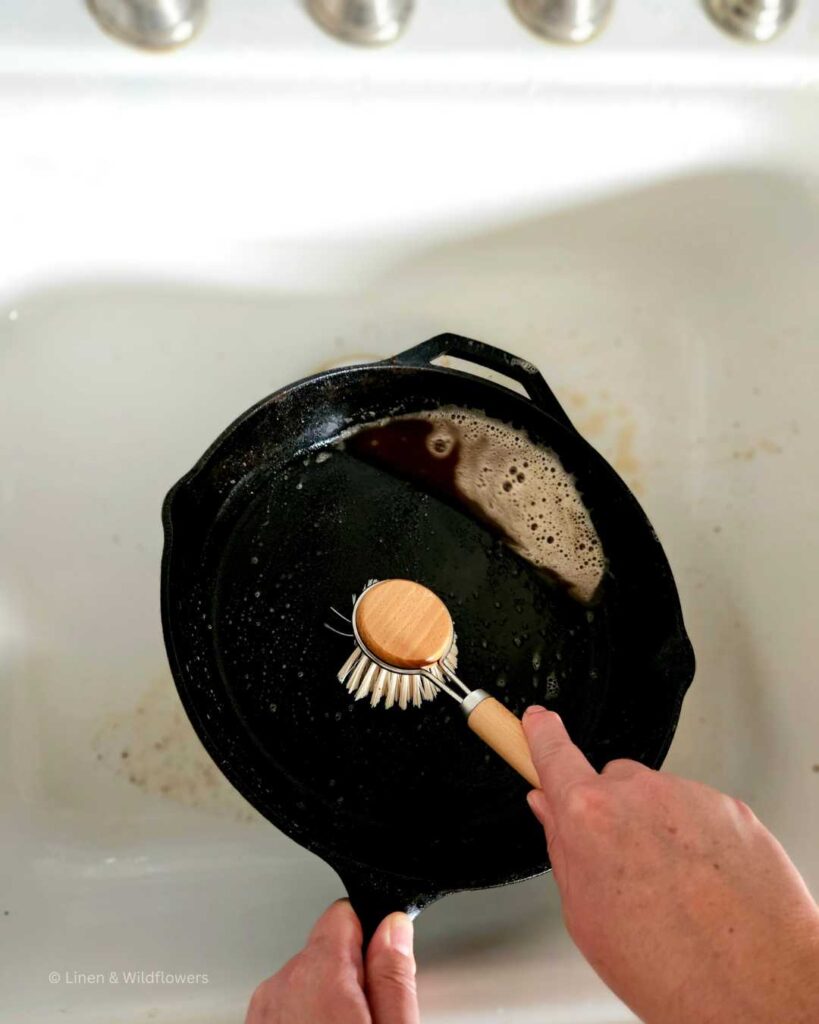
After washing, ensure that the skillet is dried thoroughly to prevent rust. Drying on the stove over medium heat is the best way to ensure it is completely dry. Then, Applying a thin layer of oil afterward helps to protect the skillet and maintain its seasoning. Regular cleaning and occasional re-seasoning will keep your cast iron skillet in good condition for years to come.
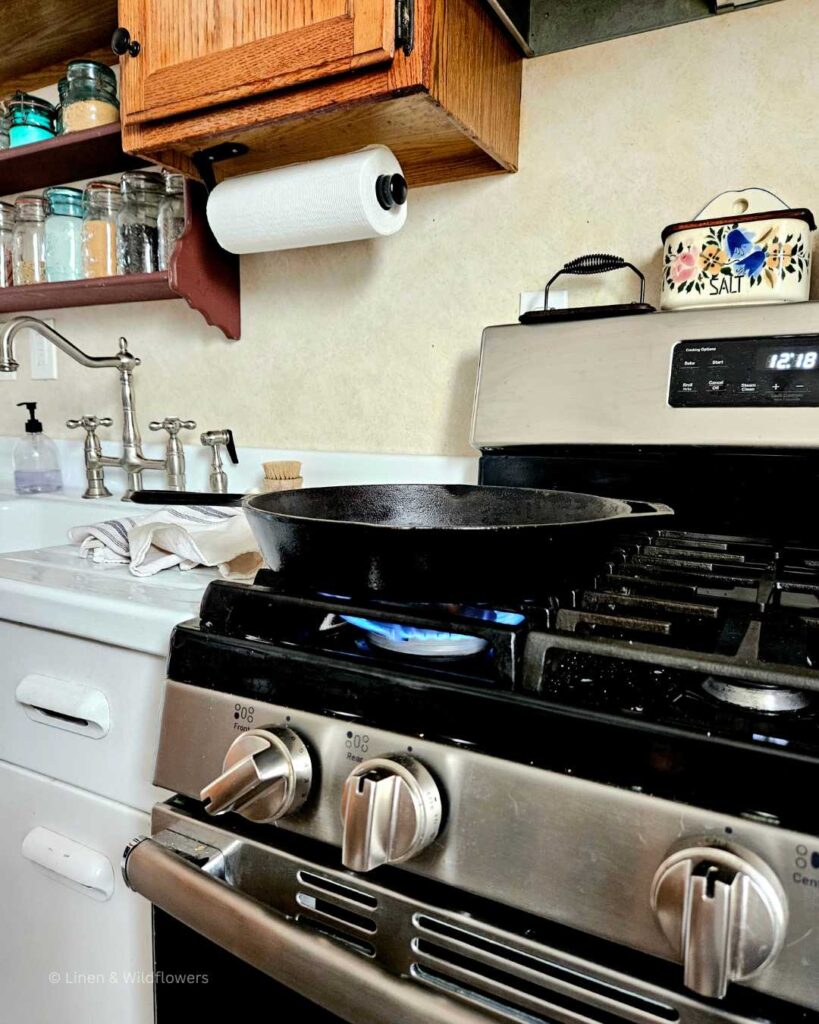
How do I properly clean a cast iron skillet?
You can effectively clean your cast iron skillet without compromising its seasoning or cooking performance. Remember, regular cleaning and occasional re-seasoning will keep your cast iron skillet in excellent condition for years to come. To properly clean a cast iron skillet, follow these steps for the best method:
1. Allow the skillet to cool
After using your trusty cast iron skillet, give it some time to cool down before cleaning. Placing a hot skillet under cold water can cause it to warp or crack.
2. Remove any food residue
Use a stiff brush or non-abrasive sponge to remove any food residue or stuck-on bits. You can add a small amount of gentle dish soap to the brush or sponge for stubborn residue. Contrary to popular belief, using a small amount of soap will not harm the skillet’s seasoning when used in moderation.
3. Rinse with warm water
Rinse the skillet thoroughly with warm water, removing all soap and residue. Avoid using extremely hot water, as it can strip away the seasoning.
4. Dry the skillet
Pat the skillet dry using a clean rag or paper towel. It’s essential to remove all moisture to prevent rusting.
5. Apply a thin layer of oil
To protect the skillet and maintain its seasoning, apply a thin layer of oil. You can use flaxseed oil, vegetable oil, canola oil, or any other cooking oil with a high smoke point. Rub the oil over the entire surface, including the handle and the bottom.
6. Store the skillet
Once the skillet is clean and oiled, store it in a dry place. If stacking with other cookware, place a paper towel or cloth between the skillets to prevent scratching.
Can I soak my cast iron skillet to remove stubborn residue?
Soaking can be an option when dealing with stubborn residue on a cast iron pan. To tackle those persistent, stuck-on food particles, you can use a little dish soap to fill your sink or a basin with warm, soapy water.
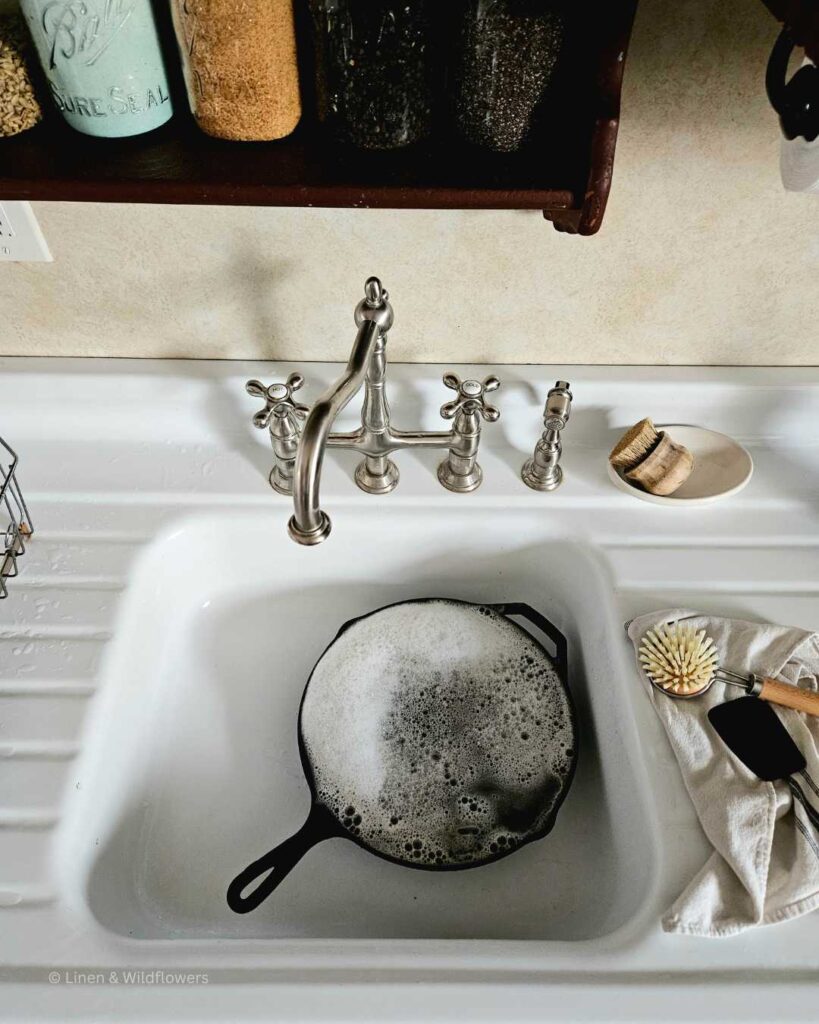
Once the cast iron pan has cooled down, submerge it in the soapy water and let the pan soak for about 15-30 minutes. This gentle soaking can help loosen stubborn residue. Afterward, using a plastic scraper, gently scrape the surface of the pan to remove the loosened debris. It’s important to avoid using steel wool or any abrasive scrubbers that can damage the pan’s seasoning. Next, rinse the pan thoroughly with warm water to remove any soap residue and ensure it’s dry to prevent rust. If the soaking has affected the seasoning, you may need to re-season the pan by applying a thin layer of oil and heating it in the oven. Remember, while soaking can be helpful for stubborn residue, it should be used sparingly to preserve the integrity of your cast iron pan.
Do I need to season my cast iron skillet after washing it?
After washing your cast iron skillet, you may wonder whether it needs to be seasoned again. The answer depends on the specific cleaning method you used. For example, if you washed the skillet with hot water and a gentle brush or sponge without using harsh detergents or scrubbing vigorously, you might not need to season it after every wash.
The thin layer of seasoning on the skillet is relatively robust and can withstand mild cleaning without being completely stripped away. However, if you notice any signs of the seasoning wearing off, such as a dull or sticky surface, it’s a good idea to re-season the skillet to maintain its non-stick properties and prevent rust. Applying a thin coat of oil and heating the skillet in the oven helps to replenish the seasoning layer. Regular maintenance, including occasional re-seasoning, will ensure that your cast iron skillet remains in excellent condition for years of reliable use.
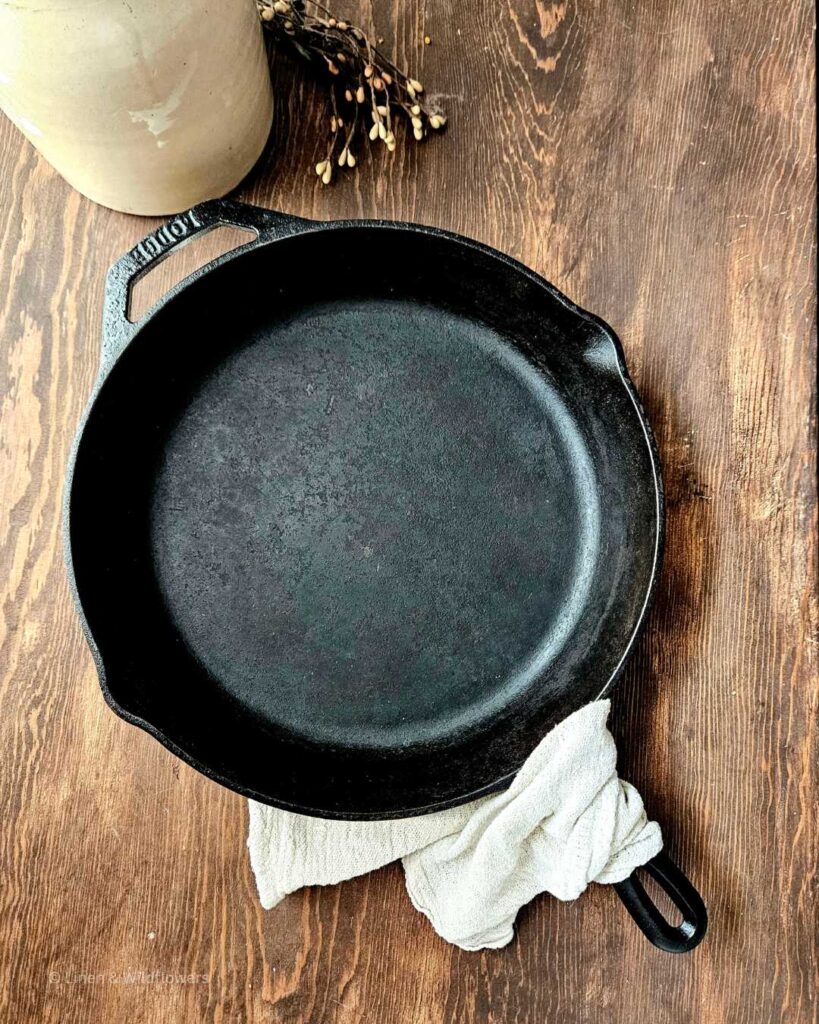
What happens if my cast iron skillet rusts?
If your cast iron skillet rusts, it can affect its performance and cooking quality. Rust forms when moisture comes into contact with bare iron, causing oxidation. When left untreated, rust can continue to spread and compromise the integrity of the skillet. In addition, the rough surface of rust can interfere with the non-stick properties of the skillet, making food more likely to stick and leading to uneven cooking. However, if your cast iron skillet develops rust, don’t panic. You can remove the rust and restore the skillet’s functionality with proper care. Scrubbing the rusted area with steel wool or a scrub brush, followed by thorough drying and re-seasoning, can help remove the rust and create a new protective layer. Regular seasoning and avoiding exposure to moisture will help prevent future rusting and keep your cast iron skillet in top-notch condition.
In conclusion
The question of whether cast iron skillets really need to be washed after use is often a topic of debate. While there are differing opinions and practices, cleaning your cast iron skillet after each use is generally recommended. Washing helps remove food residues, prevents odors and flavors from lingering, and reduces the risk of bacterial contamination. Contrary to a common misconception, using a small amount of mild soap is acceptable and will not harm the skillet’s seasoning when used in moderation. However, it is important to avoid harsh detergents and abrasive scrubbers that can strip away the seasoning. After washing, thorough drying and applying a thin layer of oil help maintain the skillet’s seasoning and prevent rust. You can enjoy the benefits of a clean and well-maintained cast iron skillet for years by finding the right balance between cleanliness and seasoning maintenance.
 If you want to follow along on our home restoration/renovation plans and all of our exciting antique & thrift finds, be sure to check out Linen and Wildflowers on Facebook, Instagram, and Pinterest! And don’t forget to sign up for our newsletter to receive updates.
If you want to follow along on our home restoration/renovation plans and all of our exciting antique & thrift finds, be sure to check out Linen and Wildflowers on Facebook, Instagram, and Pinterest! And don’t forget to sign up for our newsletter to receive updates.
Shop this Post!




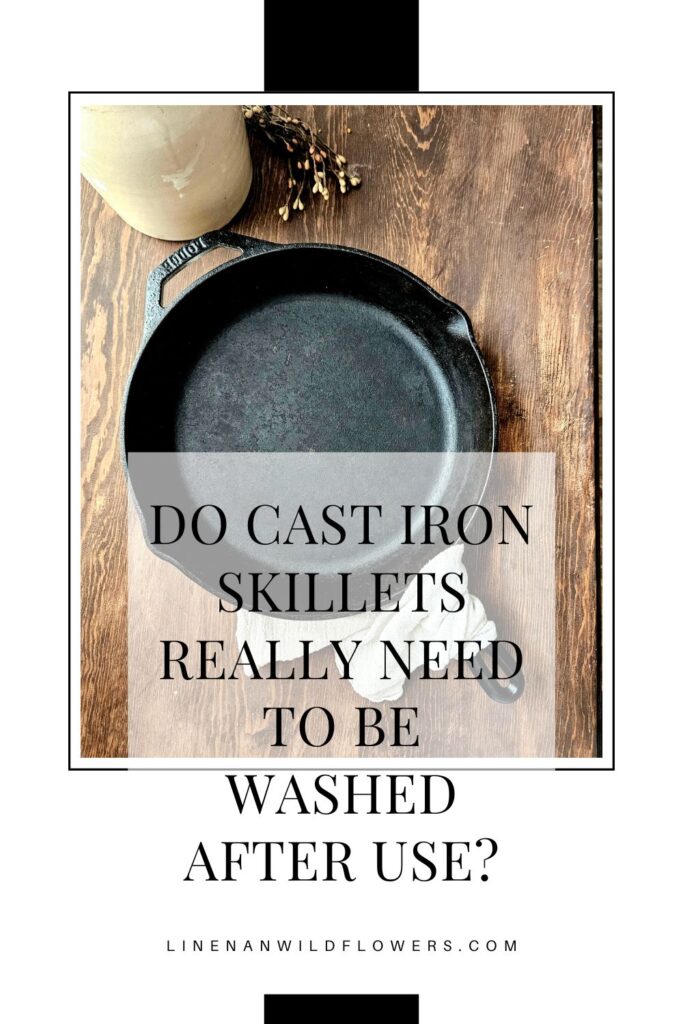
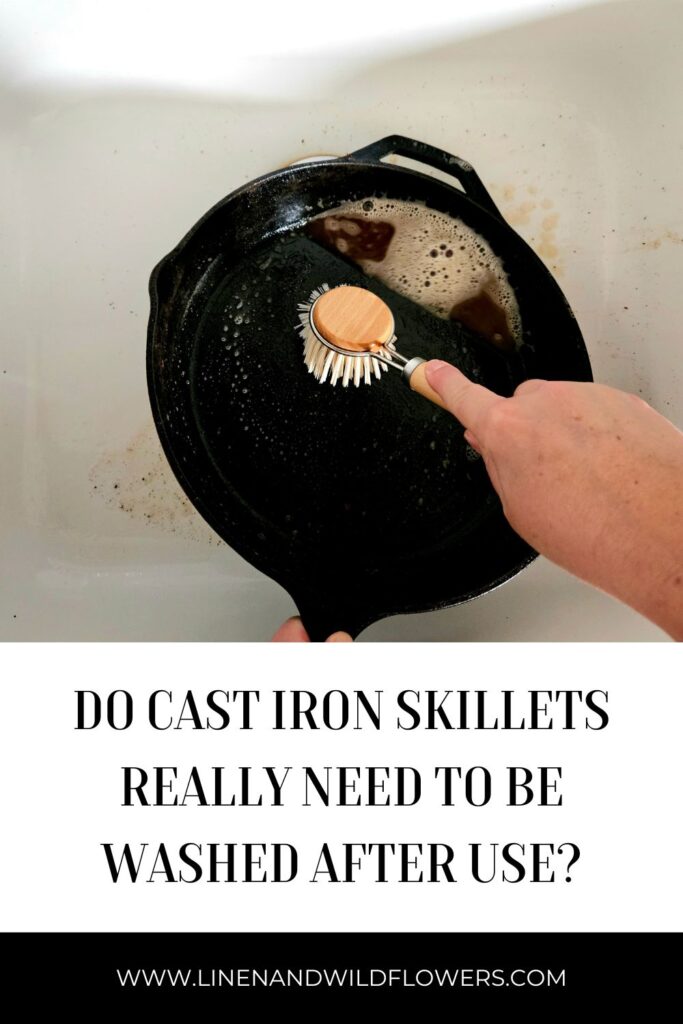
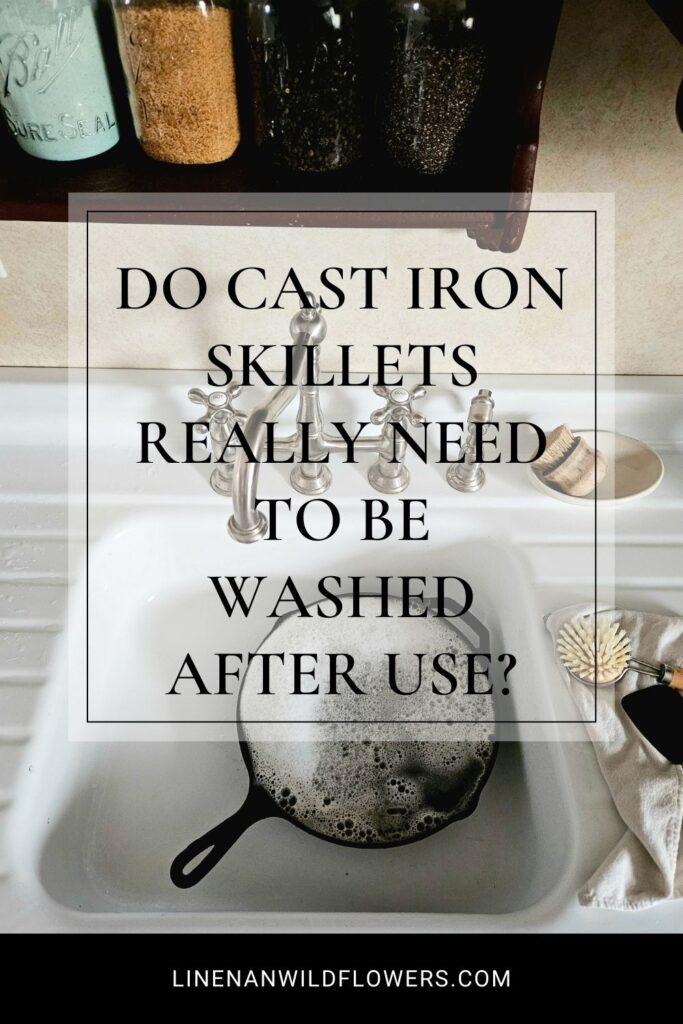
Love this post, thank you. I’m a newbie at using cast iron and I always panic as to how to properly clean them. Thank you for this informative read!
I am so glad it was helpful to you! The more you use cast iron, the more ot becomes second nature to using it!
Hi Dusty, funny you posted about this subject. Me and my wife just had a discussion on Saturday about cleaning them every time after use. I mentioned to her that I don’t think that “we” need to clean them with soap and water, every time. I was telling her the same things that you mentioned in your post. My thoughts are, if you cook on a grill outside, and we have all seen some nasty grills, it’s the same thing, but cleaner. And about cleanliness the heat kills 99.9% of whatever. Never had a bad tasting dinner, breakfast or whatever we cooked. That’s the way my mom used to do it. So yeah, my wife is going to give it a shot. Thank you for the interesting post.